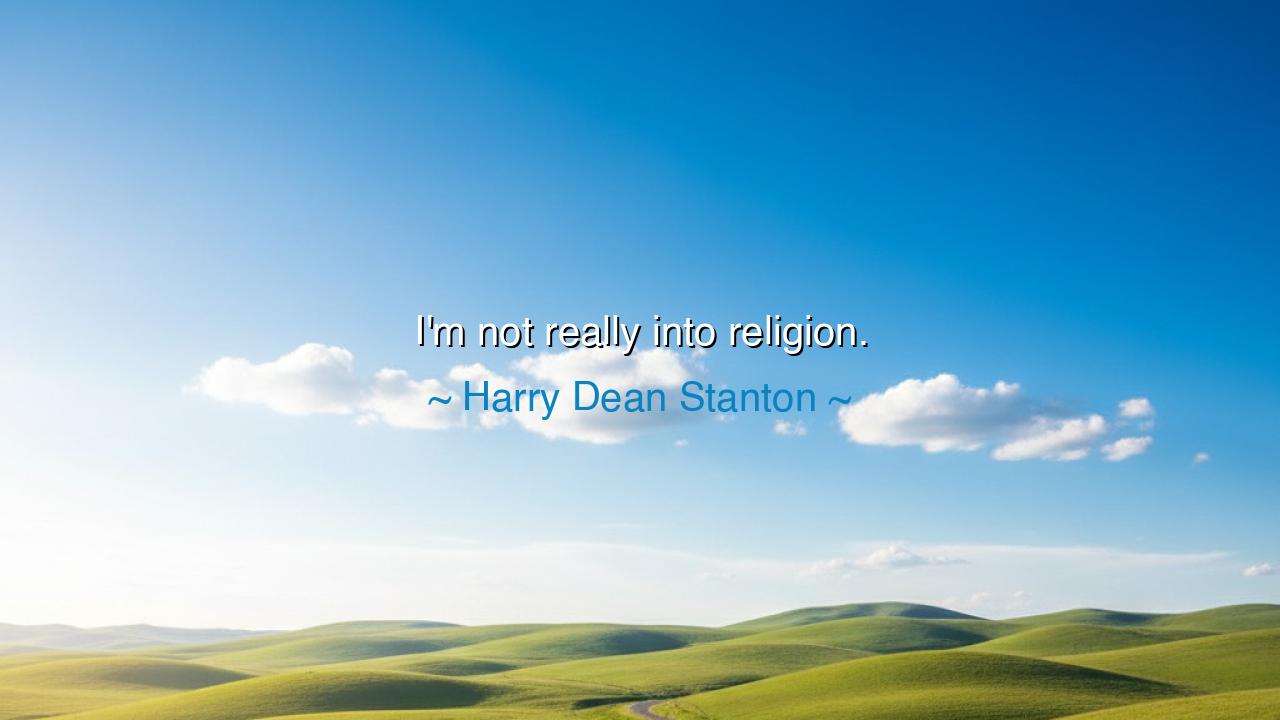
I'm not really into religion.






“I’m not really into religion.” – Harry Dean Stanton
In this plain and quiet statement, Harry Dean Stanton, the actor-philosopher of the silver screen, reveals not rebellion but reflection. His words, though simple, carry the stillness of a man who has wandered through faith, doubt, and silence and chosen the path of contemplation. To say, “I’m not really into religion,” is not to deny the divine, but to confess weariness with the trappings of it — with dogma, ritual, and the clamor of certainty. It is the voice of one who has sought truth not in the temple, but in the lonely expanse of life itself.
Stanton lived as the ancients might have admired — with quiet observation, humility, and an almost mystical acceptance of what is. His statement echoes the words of the old philosophers who sought the sacred not through institutions but through awareness. Socrates spoke of the “unknown god,” hinting that divinity lies beyond human naming. Likewise, Lao Tzu, the sage of the Tao, warned that the name that can be spoken is not the eternal Name. In Stanton’s simple phrase, there is this same ancient knowing — that the divine cannot be confined, and that religion, while it may point toward truth, cannot contain it.
The origin of this quote comes from interviews late in Stanton’s life, when he reflected on existence with the calm of a man who had seen both fame and solitude. He had no anger toward faith; instead, he possessed a kind of spiritual detachment. His philosophy was rooted in being — in accepting life as it is, without judgment or demand for transcendence. In this way, he embodied the wisdom of the Stoics, who taught that serenity comes not from gods or rituals, but from harmony with the order of nature. To Stanton, life itself was enough of a miracle; it required no altar, only attention.
Yet his statement is not nihilism. To say “I’m not really into religion” is not to say that nothing matters. It is, rather, an act of humility — an acknowledgment that no human structure can fully explain the mystery of existence. Like Buddha, who set aside the gods to focus on awakening, Stanton’s words invite us to look inward, to live truthfully without pretense. In rejecting organized religion, he does not reject spirit; he simply seeks it in quieter places — in music, in friendship, in the breath between moments.
There is a story told of the philosopher Diogenes, who walked through Athens carrying a lantern in daylight, saying he was “looking for an honest man.” Stanton, in his way, carried a similar light — not through doctrine, but through presence. His life, spent in film and in quiet contemplation, was a search for authenticity. He seemed to say, “I do not need religion to tell me how to live; I need only honesty, compassion, and awareness.” For him, truth was not in prayer or creed, but in living fully and sincerely, moment by moment.
The lesson is this: one need not be “into religion” to live a spiritual life. To honor the divine, it is enough to honor existence — to see beauty in small things, to treat others with gentleness, to face death without fear. Stanton’s words remind us that faith has many forms. Some find it in the church; others, in the silence of being. What matters is not the path, but the authenticity with which one walks it.
So, let his words rest within you as a quiet truth. Do not mistake simplicity for emptiness, nor independence for pride. Seek your own connection to life — whether through worship, through wonder, or through simple awareness of breath. As Harry Dean Stanton knew, religion may fade, but the mystery of life remains, vast and unspoken. And perhaps that is enough — for sometimes, the truest reverence is simply to live with open eyes and a humble heart.






AAdministratorAdministrator
Welcome, honored guests. Please leave a comment, we will respond soon